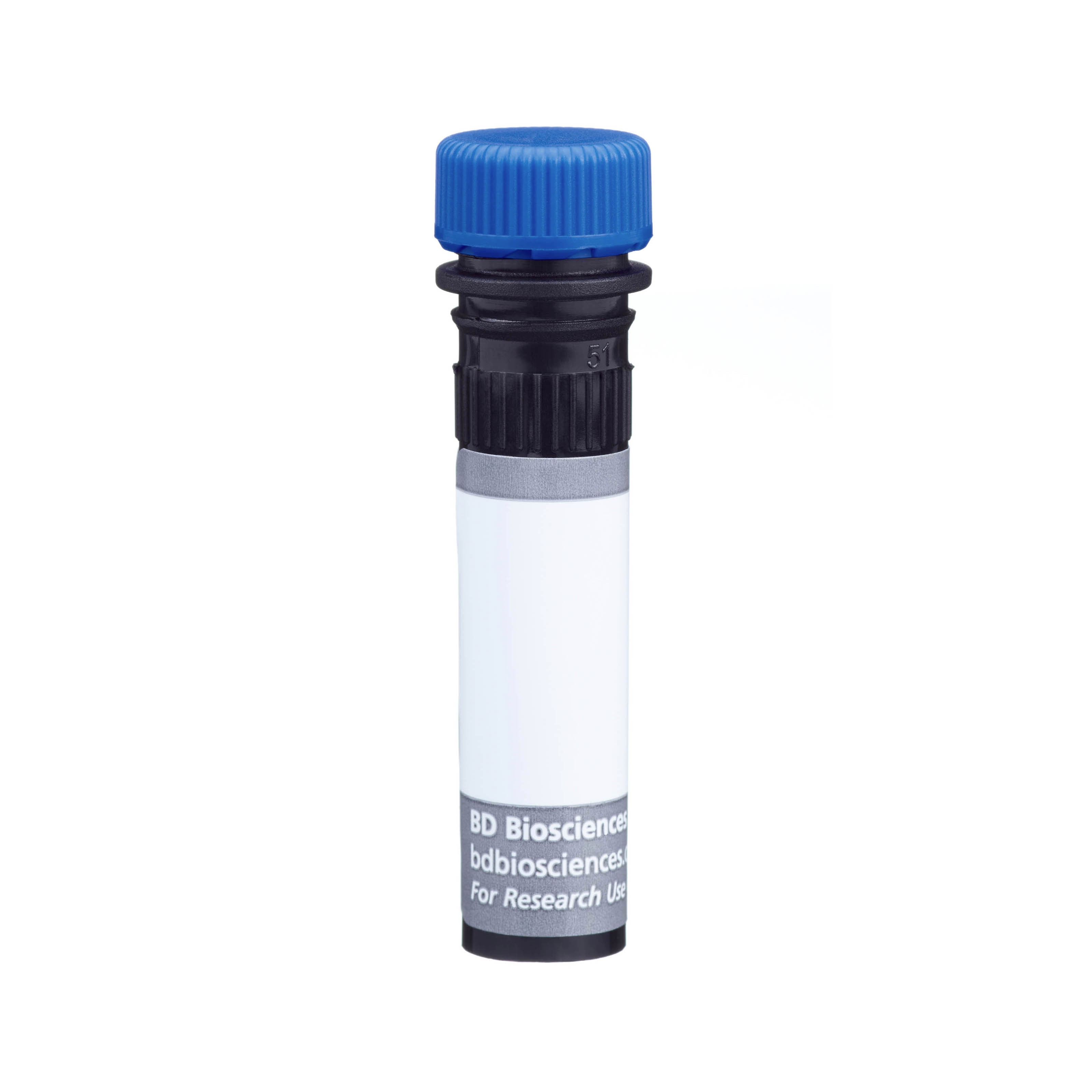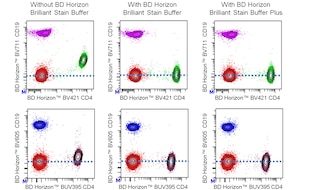Old Browser
This page has been recently translated and is available in French now.
Looks like you're visiting us from {countryName}.
Would you like to stay on the current country site or be switched to your country?


Regulatory Status Legend
Any use of products other than the permitted use without the express written authorization of Becton, Dickinson and Company is strictly prohibited.
Preparation And Storage
Recommended Assay Procedures
BD™ CompBeads can be used as surrogates to assess fluorescence spillover (Compensation). When fluorochrome conjugated antibodies are bound to BD CompBeads, they have spectral properties very similar to cells. However, for some fluorochromes there can be small differences in spectral emissions compared to cells, resulting in spillover values that differ when compared to biological controls. It is strongly recommended that when using a reagent for the first time, users compare the spillover on cells and BD CompBead to ensure that BD CompBeads are appropriate for your specific cellular application.
For optimal and reproducible results, BD Horizon Brilliant Stain Buffer should be used anytime two or more BD Horizon Brilliant dyes are used in the same experiment. Fluorescent dye interactions may cause staining artifacts which may affect data interpretation. The BD Horizon Brilliant Stain Buffer was designed to minimize these interactions. More information can be found in the Technical Data Sheet of the BD Horizon Brilliant Stain Buffer (Cat. No. 563794/566349) or the BD Horizon Brilliant Stain Buffer Plus (Cat. No. 566385).
Note: When using high concentrations of antibody, background binding of this dye to erythroid cell subsets (mature erythrocytes and precursors) has been observed. For researchers studying these cell populations, or in cases where light scatter gating does not adequately exclude these cells from the analysis, this background may be an important factor to consider when selecting reagents for panel(s).
Product Notices
- The production process underwent stringent testing and validation to assure that it generates a high-quality conjugate with consistent performance and specific binding activity. However, verification testing has not been performed on all conjugate lots.
- Researchers should determine the optimal concentration of this reagent for their individual applications.
- An isotype control should be used at the same concentration as the antibody of interest.
- Caution: Sodium azide yields highly toxic hydrazoic acid under acidic conditions. Dilute azide compounds in running water before discarding to avoid accumulation of potentially explosive deposits in plumbing.
- For fluorochrome spectra and suitable instrument settings, please refer to our Multicolor Flow Cytometry web page at www.bdbiosciences.com/colors.
- Please refer to www.bdbiosciences.com/us/s/resources for technical protocols.
- BD Horizon Brilliant Stain Buffer is covered by one or more of the following US patents: 8,110,673; 8,158,444; 8,575,303; 8,354,239.
- Please refer to http://regdocs.bd.com to access safety data sheets (SDS).
- BD Horizon Brilliant Ultraviolet 496 is covered by one or more of the following US patents: 8,110,673; 8,158,444; 8,227,187; 8,575,303; 8,354,239.
Companion Products






The YTH 76.3rMAb is a recombinant monoclonal antibody that specifically recognizes a monomorphic epitope on the extracellular region of the Human Leukocyte Antigen-B (HLA-B) heavy chain. This major histocompatibility complex (MHC) class I antigen is comprised of a polymorphic HLA-B heavy chain, a ~45 kDa type I transmembrane glycoprotein encoded by HLA-B, that is noncovalently associated with the invariant ~12 kDa Beta-2 (β2)-microglobulin light chain encoded by B2M. Hundreds of HLA-B alleles have been reported. HLA-B is expressed on most nucleated cells and leucocytes including specialized antigen presenting cells such as thymic epithelial cells and dendritic cells. HLA-B plays a major role in the MHC-restricted presentation of small peptides, including those derived from self or foreign antigens, that can be bound by TCR expressed on CD8+ thymocytes or T cells leading to either immune tolerance, the maturation of naïve CD8+ T cells, or the activation and differentiation of CD8+ cytotoxic effector T cells or memory CD8+ T cells. HLA-B also functions as a ligand for regulatory CD8 coreceptor molecules and some CD158 molecules that serve as regulatory MHC class I antigen receptors expressed by CD8+ T cells and NK cells. The YTH 76.3rMAb is derived from the hybridoma clone YTH 76.3, with Rat IgG2a, κ isotype. YTH 76.3rMAb has variable region sequences from the original YTH 76.3 clone appended to Rat IgG1 and kappa constant region sequences.
The antibody was conjugated to BD Horizon™ BUV496 which is part of the BD Horizon Brilliant™ Ultraviolet family of dyes. This dye is a tandem fluorochrome of BD Horizon BUV395 with an Ex Max of 348-nm and an acceptor dye with an Em Max at 496-nm. BD Horizon BUV496 can be excited by the ultraviolet laser (355 nm) and detected with a 515/30 nm filter with a 450LP. Due to the excitation of the acceptor dye by other laser lines, there may be significant spillover into the channel detecting BD Horizon V500 or BV510 (eg, 525/40-nm filter). However, the spillover can be corrected through compensation as with any other dye combination.

Development References (5)
-
Burrone OR, Kefford RF, Gilmore D, Milstein C. Stimulation of HLA-A,B,C by IFN-alpha. The derivation of Molt 4 variants and the differential expression of HLA-A,B,C subsets.. EMBO J. 1985; 4(11):2855-60. (Clone-specific: Flow cytometry). View Reference
-
Hale G, Clark M, Waldmann H. Therapeutic potential of rat monoclonal antibodies: isotype specificity of antibody-dependent cell-mediated cytotoxicity with human lymphocytes.. J Immunol. 1985; 134(5):3056-61. (Immunogen). View Reference
-
Margulies DH, Natarajan K, Rossjohn J, McCluskey J. Major Histocompatibility Complex and Its Proteins. In: Paul WE. Paul WE, ed. Fundamental Immunology 7th Edition. Philadelphia: Lippincott Williams & Wilkins; 2013:487-523.
-
Rojas RE, Balaji KN, Subramanian A, Boom WH. Regulation of human CD4(+) alphabeta T-cell-receptor-positive (TCR(+)) and gammadelta TCR(+) T-cell responses to Mycobacterium tuberculosis by interleukin-10 and transforming growth factor beta.. Infect Immun. 1999; 67(12):6461-72. (Clone-specific: Flow cytometry). View Reference
-
Schmidt H, Gekeler V, Haas H, et al. Differential regulation of HLA class I genes by interferon.. Immunogenetics. 1990; 31(4):245-52. (Biology). View Reference
Please refer to Support Documents for Quality Certificates
Global - Refer to manufacturer's instructions for use and related User Manuals and Technical data sheets before using this products as described
Comparisons, where applicable, are made against older BD Technology, manual methods or are general performance claims. Comparisons are not made against non-BD technologies, unless otherwise noted.
For Research Use Only. Not for use in diagnostic or therapeutic procedures.
Report a Site Issue
This form is intended to help us improve our website experience. For other support, please visit our Contact Us page.